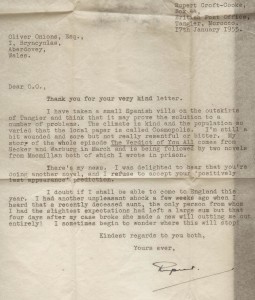Before 1967, when as a result of the Wolfenden Report, homosexual acts  between consenting adults were made legal, many men from all backgrounds, including actors, writers and at least one famous mathematician, were prosecuted and sometimes jailed. The persecution of Dr Alan Turing, the genius who helped the UK win the Second World War, is a shameful blot on the English penal system, but another victim of the law whose conviction has aspects in common with that of Turing is the less well-known writer Rupert Croft-Cooke (1903 – 75).
between consenting adults were made legal, many men from all backgrounds, including actors, writers and at least one famous mathematician, were prosecuted and sometimes jailed. The persecution of Dr Alan Turing, the genius who helped the UK win the Second World War, is a shameful blot on the English penal system, but another victim of the law whose conviction has aspects in common with that of Turing is the less well-known writer Rupert Croft-Cooke (1903 – 75).
In 1953 Joseph Alexander, the companion and secretary of Croft-Cooke, a prolific novelist, crime writer, short-story and screenplay writer, picked up two sailors in the famous Fitzroy Tavern , and took them back to Croft-Cooke’s house in Ticehurst, Sussex. After they were plied with drink Alexander and Croft-Cooke had sex with them. On their way back to London the sailors got drunk and assaulted some men, including a policeman. After their arrest the sailors agreed to tell the police about their sexual encounter in return for immunity from prosecution. Croft-Cooke and his assistant were duly arrested, tried for gross indecency, convicted and jailed. Croft-Cooke was sentenced for six months and spent time in Wormwood Scrubs and Brixton.
Almost exactly a year earlier Alan Turing had been arrested for the same offence when his lover, Arnold Murray, confessed after a burglary at Turing’s home that he was in a relationship with the mathematician. Turing pleaded guilty and was given the choice of a prison sentence or a period of probation during which he would undergo treatment with female hormones. Continue reading
